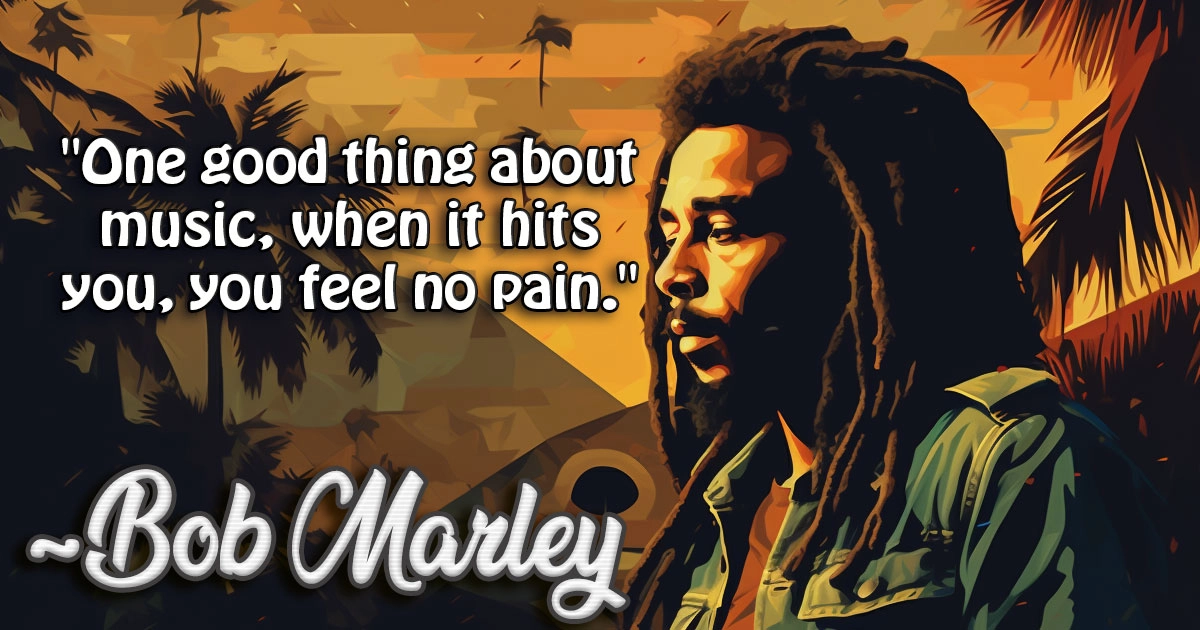Bob Marley: The Life and Legacy of a Reggae Legend

Bob Marley
Bob Marley, born Robert Nesta Marley on February 6, 1945, in Nine Mile, Jamaica, remains one of the most influential figures in music history. As the pioneering force behind reggae music, Marley used his soulful voice and poignant lyrics to address social and political issues, becoming a global icon for peace, love, and resistance. His journey from a small village in Jamaica to international stardom is a testament to his talent, perseverance, and unyielding spirit.

Early Life and Musical Beginnings
Marley's early life was marked by hardship. He was born to Cedella Booker, an Afro-Jamaican, and Norval Sinclair Marley, a white Jamaican of English descent. Norval was largely absent from Bob's life, and his upbringing fell solely on his mother. Growing up in rural Jamaica, Marley experienced poverty firsthand, a reality that deeply influenced his music.
In the late 1950s, Marley moved to Trench Town, a poor neighborhood in Kingston, Jamaica. Despite its rough environment, Trench Town was a melting pot of musical inspiration. It was here that Marley met Neville "Bunny" Livingston (later known as Bunny Wailer) and Peter Tosh, who would become his lifelong friends and musical collaborators. Together, they formed the Wailing Wailers in 1963, along with Junior Braithwaite, Beverley Kelso, and Cherry Smith. Their early music was influenced by American R&B and ska, a popular Jamaican music genre at the time.
Rise to Fame
The Wailing Wailers gained local recognition with their hit single "Simmer Down," produced by Coxsone Dodd in 1964. The song's success brought them to the forefront of the Jamaican music scene. However, it wasn't until the late 1960s and early 1970s that Marley's music evolved to include the distinct reggae sound that would define his career.
During this period, Marley embraced Rastafarianism, a religious and social movement that originated in Jamaica in the 1930s. Rastafarian beliefs, which include the worship of Ethiopian Emperor Haile Selassie I as a divine figure and a focus on African identity and resistance to oppression, deeply influenced Marley's lyrics and lifestyle. His dreadlocks, marijuana use, and spiritual themes became synonymous with his public persona.
In 1972, Marley and the Wailers signed with Island Records, led by Chris Blackwell. This partnership marked a turning point in their career, providing them with the resources to reach a global audience. Their first album with Island Records, "Catch a Fire," was released in 1973 and received critical acclaim. It was followed by "Burnin'" later that year, which included hits like "I Shot the Sheriff" and "Get Up, Stand Up." The latter became an anthem for social justice movements worldwide.
International Stardom
Marley's breakthrough came with the release of "Rastaman Vibration" in 1976. The album reached the top 10 on the Billboard 200 chart, cementing Marley's status as an international star. Songs like "War," which was based on a speech by Haile Selassie, and "Crazy Baldhead" addressed issues of racism and political corruption, resonating with audiences around the world.
In December 1976, Marley survived an assassination attempt at his home in Kingston. The attack, believed to be politically motivated, occurred just days before the Smile Jamaica concert, organized to ease political tensions in the country. Despite being wounded, Marley performed at the concert, famously stating, "The people who are trying to make this world worse aren’t taking a day off. How can I?"
Marley's next album, "Exodus" (1977), recorded in London after the assassination attempt, was a critical and commercial success. It featured hits such as "Jamming," "One Love/People Get Ready," and the title track "Exodus." The album's themes of unity, love, and resilience struck a chord with listeners, and "Exodus" remains one of Marley's most celebrated works.
Personal Life and Legacy
Marley's personal life was as dynamic as his music. He was married to Rita Anderson in 1966, and they had several children together. However, Marley also had multiple relationships and fathered several children with different women. His children, including Ziggy Marley, Stephen Marley, and Damian Marley, have continued his musical legacy, becoming successful musicians in their own right.
Marley's health began to decline in 1977 when he was diagnosed with melanoma, a form of skin cancer, on his toe. Despite the diagnosis, Marley continued to tour and record music. In 1980, he released "Uprising," which included the hit "Redemption Song," a powerful acoustic track reflecting his inner struggles and enduring hope.
In September 1980, Marley collapsed while jogging in Central Park, New York. It was discovered that the cancer had spread to his brain, lungs, and liver. Despite receiving treatment in Germany, his condition worsened, and he was flown back to Miami, Florida. Bob Marley passed away on May 11, 1981, at the age of 36.
Marley's death was a significant loss to the world of music and to the millions who found inspiration in his message. He was posthumously awarded the Order of Merit by the Jamaican government, and his legacy was cemented with numerous awards and honors. In 1994, he was inducted into the Rock and Roll Hall of Fame, and his album "Legend," a compilation of his greatest hits, became one of the best-selling reggae albums of all time.
Enduring Influence
Bob Marley's influence extends far beyond his music. His commitment to social justice, peace, and human rights has made him a symbol of resistance and unity. His lyrics continue to inspire activists and ordinary people alike, and his image is often seen at protests and rallies around the world.
Marley's impact on music is immeasurable. He popularized reggae music globally, influencing countless artists across various genres. His unique sound, characterized by a steady rhythm, soulful melodies, and profound lyrics, remains timeless. Songs like "No Woman, No Cry," "Buffalo Soldier," and "Three Little Birds" are still widely played and loved by new generations of fans.
In Jamaica, Marley is not just a musical legend but a cultural icon. The Bob Marley Museum in Kingston, his former home and recording studio, attracts visitors from all over the world. His birthday, February 6, is celebrated as Bob Marley Day in Jamaica and by fans globally.
Marley's commitment to Rastafarianism also brought greater awareness and respect for the movement. Through his music and public persona, he spread the message of Rastafari, promoting its principles of peace, love, and resistance to oppression.
Bob Marley's life was a testament to the power of music to effect change. From his humble beginnings in Nine Mile to his rise as an international superstar, Marley remained true to his roots, using his platform to speak out against injustice and promote unity. His legacy lives on through his music, his children, and the millions of people he continues to inspire. As Marley himself once said, "One good thing about music, when it hits you, you feel no pain." His music has hit countless hearts and will continue to do so for generations to come.


